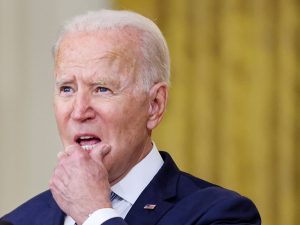
Biden makes 2024 re-election pitch in key swing state Pennsylvania
PHILADELPHIA — President Joseph R. Biden made his 2024 re-election pitch to union members in Philadelphia on Saturday in his first political rally since launching his campaign in April, aiming to shore up a key part of his political coalition and bolster support among white working-class voters.
The AFL-CIO, which includes 60 unions representing more than 12.5 million workers, endorsed Mr. Biden and his running mate Vice President Kamala Harris this week — the earliest it has ever made an endorsement in a US presidential election — and hosted Saturday’s event.
“I told you when I ran for president, I’d have your back, and I have,” Mr. Biden told the approximately 2,000 union members in attendance. “But you’ve had my back as well.”
Mr. Biden said the early endorsement would make “a gigantic difference” in the election.
The Democratic president’s frequent appearances at union events, including at a labor conference in Washington right after announcing his re-election campaign, shows how important he thinks the labor movement is to a second term.
Hailed by labor leaders as the most pro-union president in history, Mr. Biden has supported collective bargaining at companies, reversed rules implemented by his Republican predecessor Donald Trump that weakened worker protections, pushed to reverse a decades-long decline in union membership, and made it easier for union labor to build bridges and ports around the country.
In his remarks, Mr. Biden talked up his $1.2-trillion infrastructure package, passed with bipartisan support in Congress.
“In 10 years, Americans are going to look around and say, ‘Oh my God, look what we did. Look at the nation’s roads, bridges, airports,’” Mr. Biden said.
His administration has already launched 32,000 infrastructure projects across the country, Mr. Biden added. Republicans, Mr. Biden said, “are coming for your jobs. They’re coming for your job. They’re coming for your future. They’re coming for the future you’re building for your kids and your grandkids.”
Republicans are definitely coming for Mr. Biden’s job, with a crowded field led by Mr. Trump vying for their party’s presidential nomination.
White working-class union voters were divided on Mr. Biden in 2020, but he now has their support, according to some union leaders.
Some building trades unions, whose members traditionally vote Republican, did not endorse any candidate in 2020 after local leaders could not agree over backing Mr. Biden or Mr. Trump.
Ryan Boyer, head of the influential Philadelphia Building and Construction Trades Council representing 50 unions including boilermakers and steelworkers, said Mr. Biden’s track record as president has erased any doubt among his members about who to support in 2024.
“It’s a different electorate this time around,” Mr. Boyer said. “There is not one labor leader worth their salt in Philadelphia that hasn’t recognized just how much President Biden has supported men and women in labor. It’s much different.”
Union voters helped Mr. Biden win critical election battleground states including Pennsylvania, Wisconsin and Michigan in 2020. Labor is expected to play an important role in the Democratic Party’s grassroots operations in the run up to the 2024 election.
Mr. Biden won 57% of union households nationwide in 2020 compared with 40% for Mr. Trump, according to Edison Research.
But his relationship with labor as president has not always been smooth. In December, some unions criticized Mr. Biden for signing legislation preventing a nationwide rail strike. Separately, the United Auto Workers said in May that it was not immediately endorsing Mr. Biden because of his push to transition the United States into a nation reliant on electric vehicles.
Seth Harris, who previously served as Biden’s top labor policy adviser at the White House, said the president’s infrastructure, chips and climate bills, which helped create millions of jobs that do not require a college degree, will help him win over holdouts.
“The building trades … are one of the largest groups representing men who have pursued their careers without a college degree,” said Mr. Harris, now a law professor at Northeastern University in Boston. “A substantial part of the president’s economic strategy has been focused on men and women who are not going to get a college degree.” — Reuters
